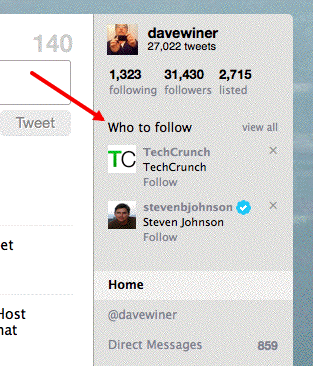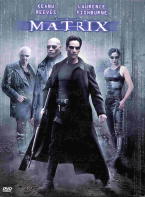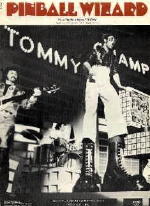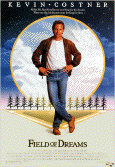
 Hey I'm (almost) a Kindle author
Hey I'm (almost) a Kindle author 
Hey just for fun I tried looking up Scripting News on Amazon, and look what came back.
This is obviously the provisional page for the "book" I uploaded yesterday.
Keep your eye on it. Maybe you can be the first to "buy" one. ![]()
 Virginia Heffernan and the science bloggers
Virginia Heffernan and the science bloggers 
After reading the NYT magazine piece by Virginia Heffernan about the plight of the science bloggers, I'm left wondering...
Virginia Heffernan: The Uses and Abuses of Science Blogging.
You could fisk the article line by line, and ask the questions it raises, but instead I'd rather ask just a couple.
1. To me, it seems it totally matters who you're blogging alongside. She says journalists deal with this all the time, if so -- there must be reporters at the NY Times who are on the payroll of corporations whose work they're writing about. If true, is this adequately disclosed?
I'm pretty sure she's wrong, and that what happened at scienceblogs.com has never happened at the Times. If it has, that's a front page story.
It seems more likely, however, that she simply doesn't understand what happened with Pepsico and the science bloggers.
 The science bloggers were very right to be concerned with how much disclosure there was going to be about the Pepsico bloggers. And of course if they want to resign and find a new place to blog, in what way isn't that their right? If Ms. Heffernan thought the NY Times was no longer a good place for her to write, who could blame her for moving on? Does anyone need a better reason?
The science bloggers were very right to be concerned with how much disclosure there was going to be about the Pepsico bloggers. And of course if they want to resign and find a new place to blog, in what way isn't that their right? If Ms. Heffernan thought the NY Times was no longer a good place for her to write, who could blame her for moving on? Does anyone need a better reason?
What Seed Media did is very much like the way conference promoters, these days, deal with sponsorship. I've run four conferences in the last few years, and each time when I sought sponsorship I was told that I'd have to accept speakers from the sponsor companies, and I would not be allowed to tell the participants these were paid-for speakers. I would never do that, though I'm sure I've been to a number of conferences that do.
I was an advisor to a conference that did it. When I found out, I did what the science bloggers did -- I quietly left. You can't keep your integrity while standing with people who would do this. You're lending your name to something disreputable. In this piece Ms. Heffernan damaged the reputation of the Times, every reporter there, and also other pubs and their reporters. It seems the Times needs to explain what she is saying.
However, based on past experience, I don't expect the Times to take a question from Scripting News seriously. So if you're a reporter at a publication the Times does respect, I hope you'll raise the question. It deserves an answer.
 2. She provides a few out-of-context quotes from blogs that I, and I assume most of her readers, are not familiar with. What are we to think these quotes mean? We should believe that science blogging is a sham, has little to do with science, and is mostly people who are making it up. Okay. However beyond the quotes, she doesn't provide any evidence.
2. She provides a few out-of-context quotes from blogs that I, and I assume most of her readers, are not familiar with. What are we to think these quotes mean? We should believe that science blogging is a sham, has little to do with science, and is mostly people who are making it up. Okay. However beyond the quotes, she doesn't provide any evidence.
Probably the most disturbing thing about the Heffernan piece is the lack of respect for her readers. Why should I believe what she says if she isn't prepared to offer anything serious to back it up?
The Times is at its best when it gets us to think. If we're to think, we need a respectful presentation of facts that when, taken together, are puzzling or interesting or important. Heffernan's piece only gets us to think about her and her editors and why this piece is in the Times. I don't have a clue about that.
For the record, I am not a science blogger. I've only started reading their blogs recently. To help me understand what they're doing I wrote an aggregator which I'm sharing with anyone else who wants a look. I wrote a couple of pieces about their plight. That's the extent of my involvement with science blogging. I would love to read a similar disclosure from the Times and their reporter.
 OMG, Twitter is suggesting people to follow?!
OMG, Twitter is suggesting people to follow?! 
Isn't it funny how when Twitter does something that others have been doing for ages it's still innovative? But it is.
So look what just showed up in the right margin on the Twitter home page...

Follow TechCrunch and Stevin Berlin Johnson. Good ideas!
 But wait a minute -- holy guacamole -- it looks an awful lot like -- omg -- could it be -- the dreaded, evil Suggested Users List.
But wait a minute -- holy guacamole -- it looks an awful lot like -- omg -- could it be -- the dreaded, evil Suggested Users List.
Has it returned from the dead?
It looks suspiciously like it has. Haven't seen one ordinary person in there, after about a dozen refreshes. They all look like either Friends-of-Ev or celebs with big MSM names. Or reporters that write sweet nothings about Twitter, Inc.
 Only this time they aren't just targeting newbies, the kinds of people who sign up, see nothing interesting and then disappear. I already follow 1323 people, and I've been on Twitter since 2006. According to Google I've blogged about it 3490 times (not including this post). What could possibly be the rationale for asking me to follow Tim O'Reilly or John Battelle. How about instead suggesting some people for me to unfollow. (I'm not kidding, I suffer from tweet overload.)
Only this time they aren't just targeting newbies, the kinds of people who sign up, see nothing interesting and then disappear. I already follow 1323 people, and I've been on Twitter since 2006. According to Google I've blogged about it 3490 times (not including this post). What could possibly be the rationale for asking me to follow Tim O'Reilly or John Battelle. How about instead suggesting some people for me to unfollow. (I'm not kidding, I suffer from tweet overload.)
Yeah they totally suck.
Why don't they write some software down there at Twitter and stop nominating their friends for awards.
Where's my opt-out of this? I want to get rid of this thing. Now.
Update: They've blogged about it, but it sure doesn't sound like what I'm seeing. They don't mention the user interface on the Twitter front page.
Update #2: Here's how you opt-out. Just click on all the X's next to all the names as they pop up. Once you've killed them all, the feature just goes away.
 Starbucks and free wifi, continued
Starbucks and free wifi, continued 
 Follow up to the piece earlier this week.
Follow up to the piece earlier this week.
You may not like Starbucks coffee, it's not my favorite (that was kind of the point) -- but I'll go there over other choices because of the free wifi. It's funny because I have other choices because I have Verizon Mifi. And the freeness of Starbucks shouldn't matter either because until recently I had AT&T Internet service (at the house in Berkeley) and therefore Starbucks wifi was always free, for me.
There's a funny thing that happens, maybe some psychologists can explain, when something is free for everyone -- that makes it more valuable for you, even if you don't really care if it's free.
Anyway, some free advice for Au Bon Pain and all the pizza joints near the Starbucks on Astor Place, figure out how you can provide free wifi too. I bet it's going to make a diff in your business, pretty soon. It'll be like offering your customers a free glass of water if they ask for one.
 On my way to publishing a Kindle book
On my way to publishing a Kindle book 
 This morning I published a book for distribution via Kindle. I took the full content of Scripting News for 2009, formatted it according to their rules. That was the hardest part. You have to render it as simple HTML and all the images have to be included in the zip archive you upload. That meant writing a parser that went through the text, pulls out the images, downloads them locally, and patches the URL in the HTML.
This morning I published a book for distribution via Kindle. I took the full content of Scripting News for 2009, formatted it according to their rules. That was the hardest part. You have to render it as simple HTML and all the images have to be included in the zip archive you upload. That meant writing a parser that went through the text, pulls out the images, downloads them locally, and patches the URL in the HTML.
I couldn't figure out how to price it at $0. The lowest price was $1.99. Hope that isn't a problem. Of that, I will get 35 percent or about 70 cents. I don't expect it to amount to a lot of money.
I want to write a book, and I have some people I'm brainstorming with. By starting to publish to the Kindle, even in a rough format, I start to get my feet wet. For me, a veteran bootstrapper, this may be a necessary first step.
Anyway, it may take a few days for it to make it through their approval process. When it's available for purchase I'll post a pointer here.
If you want to download it now, here's the archive.
http://static.scripting.com/misc/2009.zip
Let me know what you think (and please think before you comment).
PS: Wonder if I'm going to have to pay $1.99 to see what my stuff looks like on a Kindle? That would totally suck.
 DO YOU THINK BEFORE YOU COMMENT?
DO YOU THINK BEFORE YOU COMMENT? 
I KNOW IT'S JARRING THAT THIS PIECE IS IN ALL CAPS BUT I WANTED TO SEE IF IT MADE A DIFFERENCE.
WHAT ARE THE CHANCES THAT THE COMMENTS HERE MIGHT IN SOME WAY BE RESPONSIVE TO WHAT I SAID, RATHER THAN JUST BE RECITAL OF PARTY LINE STATEMENTS THAT INVOLVE THE KEYWORDS IN THE PIECE.
FOR EXAMPLE: ADOBE, FLASH, APPLE, HTML 5. GO AHEAD TELL ME WHAT YOU THINK.
THERE ARE MANY OTHER EXAMPLES. IF I SAY "THE IPHONE 4" I WILL BE LABELED IN OTHER WAYS.
ANYWAY I'M TIRED OF SCREAMING AT YOU.
HAVE A NICE DAY. ![]()
 science.newsriver.org
science.newsriver.org 
 Earlier this month I reported on bloggers leaving scienceblogs.org because the publisher sold a presence on the site to bloggers from PepsiCo.
Earlier this month I reported on bloggers leaving scienceblogs.org because the publisher sold a presence on the site to bloggers from PepsiCo.
One of the rationales for bundling all the science bloggers together in one place was the synergy that comes from aggregation. Of course, with RSS you can achieve the same effect, without putting them all on the same server. So I put it on my to-do list to set up an science blogs aggregator, and yesterday I had some time to do it, so here it is.
As always, the OPML for the site is public so if you want to feed it into your aggregator you're welcome to. You should reimport the OPML from time to time, or ask your aggregator developer to do it for you -- because that list will be updated dynamically as the site grows.
And if you know of science blogs that should be included in the list, please post a comment here.
 Ole and Lena ride again
Ole and Lena ride again 
Some people don't care for them, but I love Ole and Lena jokes.
Here's a good one.
Ole was going on a business trip to St Cloud but it was cancelled at the last minute cause the Minnesota Twins made it to the playoffs.
He's lying in bed before going to sleep when the phone rings.
He listens, gets up to look out the window then returns to the phone.
He says in an irritated way: "How should I know, it's a thousand miles away!" and hangs up.
Lena asks: Who was that Ole?
Ole: Oh Sven yust vants to know if the coast is clear.
![]()
 Kindle is OK
Kindle is OK 
 The iPad with its Kindle app got me interested in reading on a tablet again.
The iPad with its Kindle app got me interested in reading on a tablet again.
But it's summertime, and I'd rather read in the park, or on a bench looking out over the Hudson.
The iPad doesn't work for outdoor reading if there's any sun at all.
Further, I have a backlog of unread books I bought on Amazon, and I don't see why I should replace them (or if I can) using Apple's store.
I already buy a lot of stuff from Apple, and I don't like how they push around app developers and content companies. We're talking about First Amendment stuff here. So I vote with my dollars, and feel good about it.
So a couple of weeks ago I bought a Kindle DX, and I think it's a great product.
When I read on tech blogs that Kindle is a goner, I think these people must not read very much. Reading isn't about tech prowess or the shiniest gadget.
The Kindle is lighter, works in more places, has longer battery life, better connectivity, and has the biggest base of content. Plus they have been very smart about making their content available on every device known to man, including Apple's.
Bottom-line: Don't worry about the Kindle.
 We'd probably survive a 500-character limit
We'd probably survive a 500-character limit 
 Xcv comments: "At the large tech company I work at there is an internal micro-blogging tool. The limit was recently increased from 140 to around 500.
Xcv comments: "At the large tech company I work at there is an internal micro-blogging tool. The limit was recently increased from 140 to around 500.
"People are still writing concise things. It is just incredibly refreshing to not have to abbreviate things. And also you can include full links instead of shortened crap."
Interesting story.
 Starbucks' free wifi is the deciding factor
Starbucks' free wifi is the deciding factor 
 In the neighborhood around NYU we have a million places to get coffee, and many of them have free wifi. The ones that don't, like Au Bon Pain, which have better food, can't compete. And most of the free-wifi places have inferior wifi. So this morning, when I was looking for a place to work for a bit, there was no choice but to find a Starbucks, get an iced coffee, and sit down.
In the neighborhood around NYU we have a million places to get coffee, and many of them have free wifi. The ones that don't, like Au Bon Pain, which have better food, can't compete. And most of the free-wifi places have inferior wifi. So this morning, when I was looking for a place to work for a bit, there was no choice but to find a Starbucks, get an iced coffee, and sit down.
Not sure where they're going to go with the free wifi, I hope they add some features, and I hope they find a way to make it pay. But right now, it gives them the advantage over all the other places. Working, free wifi is a big deal.
 What's the point of the magic trackpad?
What's the point of the magic trackpad? 
On Twitter, Dossy wonders why the new Magic Trackpad from Apple.
Come on guys get with the program. You're in the middle of a bootstrap. This is the next step.
Apple has a new operating system called iOS. It's what runs on iPods (which they are phasing out), iPhones and iPads.
What doesn't it run on? (Yet.)
Why not? Wellllllll. Cause for one thing, the Mac is built around a mouse as a pointing device and iOS is built around fingers as the pointing device. So if you want to run iOS software on Mac hardware don't you need a little new hardware? Just a little?
Come on, this isn't that hard. It's Software Evolution 101.
 Will the 140-char limit drop next?
Will the 140-char limit drop next? 
From Mashable comes news that Twitter is adding pictures and video to the tweetstream.
Verrrrra nice.
So....
How about dropping the 140-char limit too? ![]()
And please spare me how it all has to fit into an SMS package because I don't know, maybe a video takes up a bit more than 140 bytes.
![]()
 A hybrid of Google Calendar, Foursquare and Flickr
A hybrid of Google Calendar, Foursquare and Flickr 
Let's say I'm having lunch with Andrew Baron next Tuesday at a local restaurant. We both put items on our calendar. Link those two items, and then link both of them to the location we're having lunch at.
When the big day comes, I whip out my iPhone, which of course is synched to my calendar, and take a picture of Andrew and he takes a picture of me. The pictures automatically are linked to the calendar entry and to the location.
Now, someday anyone (since we made this public, why not) who's just trawling around wonders if we ever met, they not only know where and when but what we looked like that day.
Of course the right way for this to work is if it isn't a hybrid, but just nicely interconnected.
 Add this to Twitter's to-do list
Add this to Twitter's to-do list 
Sheamus wrote a list of 5 things Twitter should do ASAP.
I have something to add to that list.
I want to be able to delete a tweet from my @replies tab.
So if someone sends something unpleasant to me, I don't have to block them to get rid of it.
Just the ability to hide one tweet. Please.
 Inception is to The Matrix as...
Inception is to The Matrix as... 
 A lot of people seem to like Inception. Many of them are very smart. I don't get why they like it. I found it disappointing.
A lot of people seem to like Inception. Many of them are very smart. I don't get why they like it. I found it disappointing.
I really wanted to like it. I need a movie like The Matrix, which was one of the most inspiring movies of all-time, a movie I still quote, more than ten years after it came out.
But Inception is to The Matrix as Dan Quayle is to Jack Kennedy. Inception is actually worse. Try this out. Inception is Fat Albert and The Matrix is Jack Kennedy. Hey hey hey!
Inception is a sloppy movie that gives great trailer. Think about it. All the great visuals in Inception are in the trailers. After the great visuals, what is there? A plot so grandiose and sloppy that the characters spend half the dialog explaining how it works. Okay that could be interesting. But it's not.
I had the feeling of being in a movie theater watching a long boring movie, enjoying the air conditioning and popcorn. Thinking about what I'd do when I got back to work. Believe me, nothing like that happened the first time I watched The Matrix. Or the second, or third, or fourth, or fifth. I could watch it again right now and still love every line of dialog. Inception? Maybe it had two or three ideas that made you think. The rest of it was slop.
Okay so let me put my stake in the ground. David Weinberger says it's going to be nominated in 12 categories and win most of them.
I say Inception is Avatar. It won't win any of the big awards. If it's the best movie of 2010 it's going to be a very very very bad year.
 Zero-tolerance for mindless Apple advocacy
Zero-tolerance for mindless Apple advocacy 
I'm taking a page out of Apple's playbook.
If you can't stay on-topic, I'm not only deleting your comment but adding you to the blacklist.
I'm trying to improve discourse on my blog in a way similar to Apple's wanting to improve the apps on the iPad. This feels very symmetric to me.
 Apple's Flash policy is a breach of Postel's Law
Apple's Flash policy is a breach of Postel's Law 
 I was browsing the web today on my iPad looking for the lyrics to a song I heard yesterday on the Jonathan Schwartz show on WNYC.
I was browsing the web today on my iPad looking for the lyrics to a song I heard yesterday on the Jonathan Schwartz show on WNYC.
It's a show tune, that started off not-too-interesting but by the end the lyrics had me choked up. It was a beautiful story, and I not only wanted to hear it again, but I wanted to share it with others.
I eventually found a rendition of it on YouTube, but during my exploration I came across a Flash thingie (what are they called) that promised to have some info about the song, but of course since Apple doesn't like Flash, my iPad can't "see into" it.
Aside: The song I was looking for turned out to be Life Story sung by Lynne Wintersteller from the play Closer Than Ever.
It was at this point that it hit me that what Apple is doing with Flash is dangerous, for reasons I hadn't previously considered.
Deliberately throwing out content that might have useful information in it, that's not too wise, imho. Better to keep as much as we can, and stop worrying too much about whether we like the format or not.
And what Apple is doing violates Postel's Law which says you should be liberal in what you accept. Another reason Postel was wise. It helps keep the web from breaking.
A reminder that now that Apple's market cap is bigger than Microsoft's we have to think about what it does differently. If Microsoft had decided to outlaw a popular format, no matter how much we may not like it, we'd look at that as an anti-competitive move. Why should we look at it any differently if it's Apple?
Update: You can view what Apple has done as linkrot, but on a massive scale, and it was deliberate. Linkrot is usually accidental, but this was deliberate. If Microsoft had done this, the very same people who are defending Apple so fiercely would be (virtually) marching on Redmond with torches threatening to burn it to the ground.
 In Washington it's all public relations
In Washington it's all public relations 
 The banking reform bill is all smoke, I hear -- from people who know.
The banking reform bill is all smoke, I hear -- from people who know.
An analogy.
We've noticed that in the summer buildings get hot. Sometimes they get so hot that people die! So we've just passed a law that all buildings must have air conditioning. But you don't have to turn on the AC until the temp gets to 150 degrees. Oh that does a lot of good. (Not.)
Obama signed the bill, hailing it as the most significant banking reform legislation since the Great Depression. Will it do anything to prevent the kind of meltdown we had in 2008? Nahhh. That would spoil the fun. How can the bankers soak the last bit of life from the US economy if they're regulated.
Forbes says Obama is anti-business.
Obama calls him up to say thanks.
Now he can get re-elected.
As if we'd vote for Mitt Romney.
As if it would make a diff.
 Apple as Captain Queeg
Apple as Captain Queeg 
 If you've never seen the movie, this is how it goes. Captain Queeg, played by Humphrey Bogart, is a career naval officer, in charge of a ship that drags targets for battleships to practice on. It's part of the huge Pacific fleet during World War II.
If you've never seen the movie, this is how it goes. Captain Queeg, played by Humphrey Bogart, is a career naval officer, in charge of a ship that drags targets for battleships to practice on. It's part of the huge Pacific fleet during World War II.
Queeg is a mid-level guy, not going anywhere. It being wartime, most of his officers are draftees -- college kids, smartasses, in one case a coward (played by Fred MacMurray). There's another career officer on the Caine played by Van Johnson.
The captain is way past his prime. Mediocre. A failure that they've kept around because no one had the time to retire him. The same story for the Caine. So it tries to stay out of range when the other American boats take shots at the targets it drags.
Queeg does all kinds of stupid shit, like navigate over the towing line of a target the Caine is towing, thus losing it. He's weird, he likes to play with steel balls. When he discovers that some of the frozen strawberries are missing from the pantry he starts an investigation. He says it's about time they had some fun on the ship. He believes they were stolen by some of the officers. He's reliving a victory of his early career. This is too much for the college kids, so they convince Van Johnson to depose the captain, in the famous mutiny that the movie and the Herman Wouk novel are named after.
Classic movie, with some great performances. And somehow the story comes up all the time in real life, especially in the tech industry.
Anyway, just when it seems the rest of the world is ready to let Antennagate go, here comes a Youtube video from Apple, dragging the Droid-X into the mess. Now Apple's competitors get to look aloof, like leaders, puzzled why the captain is making a federal case about the strawberries.
 The users just got their emails telling them how to get their new cases. The thought occurred to me that Apple could have given us a nice present anyway, even if there hadn't been a PR mess. Wouldn't that have been classy. We appreciate that you're an early supporter of our products (knowing we're the ones who always get screwed, we know it, but they don't have to say it). So here's a nice gift. It's really nothing, but it's our way of saying we appreciate you.
The users just got their emails telling them how to get their new cases. The thought occurred to me that Apple could have given us a nice present anyway, even if there hadn't been a PR mess. Wouldn't that have been classy. We appreciate that you're an early supporter of our products (knowing we're the ones who always get screwed, we know it, but they don't have to say it). So here's a nice gift. It's really nothing, but it's our way of saying we appreciate you.
Instead, they're taking stupid cheap shots at the upstarts, making themselves look stupid and cheap. They so totally don't need to look that way.
Now I don't think for a minute that Apple is Captain Queeg. It's not some marginal character in a big war. It's more than an aircraft carrier, it's a whole fleet. So why are they acting like a burned out captain of a mine-tower who thinks he's found the missing strawberries.
 About Flipboard and reading surfaces
About Flipboard and reading surfaces 
 A few days ago Scoble posted a tweet saying that he had seen the Excel or Pagemaker for the iPad platform. It turns out that product is Flipboard, from Mike McCue, who I know from Netscape days. Mike went on to found Tellme which sold to Microsoft.
A few days ago Scoble posted a tweet saying that he had seen the Excel or Pagemaker for the iPad platform. It turns out that product is Flipboard, from Mike McCue, who I know from Netscape days. Mike went on to found Tellme which sold to Microsoft.
I haven't been able to use Flipboard yet, their servers are too busy, but from Scoble's video and their website, I think I understand what the product is.
Prior art: Pointcast, Netscape's initial RSS aggregator, Daylife (a NY company I have invested in).
If subscribes to your Twitter and Facebook feeds, grabs links to pictures and stories your friends point to, and presents them in a visually appealing way. Behind the scenes there's a lot of RSS (hence the connection to Netscape's RSS aggregator), but it's not a River of News, it's a "magazine style" reader. It is initially appealing, but I'm not sure whether it is useful over time. Scoble says he's been using it for hundreds of hours and still likes it. That's a point in their favor, Scoble really works this stuff.
Normally I wouldn't write a piece until I'd had a chance to use a product, but this time I want to put a question out there about the architecture and plumbing, and see what comes back.
With no disrespect, Flipboard is a scraper. It takes content flows that weren't intended for this kind of presentation and repurposes them. How could they do otherwise, it's a chicken-and-egg situation. Right now there is no content that is specifically designed for a Flipboard-like environment. But now that their product exists, it seems we have one half of the puzzle in place, why not put out a proposal to the content tools vendors (of which I happen to be one) and say this: If you want to produce content flows that look beautiful in our environment, here's how to do it. Let us either put hints in our source code for you, or create new renderings of our source code specifically to be viewed in the new environment.
I want to get this idea out there as soon as possible. Mike is a smart guy, and I'm sure he has hired some smart people. I don't doubt that they've thought of this. The question is -- have they done it?
And more broadly, there certainly are others working in this area. How can we all work together to boot up a great new level of reading and writing, on the iPad and elsewhere?
I want to be clear -- I'm on the authoring tools side of this. Aside from my small investment in Daylife, I have no stake in the reader side, at least not at this time.
For background, I explained this idea in a piece earlier this month.
 How to do open development work, Rules 1 & 2
How to do open development work, Rules 1 & 2 
 Last night, at a NYC dinner party, a reader suggested I write a Ten Commandments of open development work.
Last night, at a NYC dinner party, a reader suggested I write a Ten Commandments of open development work.
Even though it reeks of hubris, it's probably a good idea.
I've been involved in a lot of open development work over the last 30 years, and some of it has worked, but most of it fails. When it fails it's almost always because some group of people violated what I will call Rule 1.
Rule 1: All meetings must be open to anyone who wants to participate.
This is important because it means that any control anyone is exerting is visible to anyone who wants to see it. And that visibility tends to limit the control.
As soon as you have an invite-only meeting, someone is going to have to take your word that the process is fair. And the process isn't fair. So, if you say it is, you're lying. And lies are a terrible foundation to build on.
I think SOAP died when it became clear that Microsoft and IBM were having private meetings.
It's why so many of the supposedly "open" formats that Google is promoting have no chance of working in the market. I can't read minds, so I can't tell you why they do it. But it never works. A lie is a lie, even if you work for the largest company in the universe.
Rule 1 is the mechanism whereby small developers, even the ones who aren't blessed with invitations, have a chance to compete in a world ruled by the large companies. (And by the way if you get an invite it doesn't mean they like or respect you. You're probably the fig leaf they'll use the "prove" the process was open, even when it wasn't.)
But a pragmatist might say -- if we made the meeting open to all, and announced it publicly, 1000 people would show up and we'd get no work done. True. I've been in those meetings. And listened to one boring speech after another, and during all that boredom I figured out Rule 2.
Rule 2: If you have a choice, ratify defacto standards instead of reinventing them.
When it came my turn to speak in the 1000-person meeting, I said we could all leave the room this day with a standard if we just ratified RSS instead of trying to create something new that does exactly what RSS does. Even though what I said was true, no one could refute it, we didn't do it. And here we are eight years later and the defacto standard still rules.
The great thing about both these rules is that even if you break them, they still rule.
If you have an invite-only meeting then your work is for nil, and the people who aren't at your meeting will route around you, and if there's value in an open standard, it will be created in the haphazard way that open formats come about, naturally.
If you choose to reinvent a defacto standard, you will still have to support the defacto standard, and it will grow while people may implement your competing format, but lots of people will wonder why they should bother, and won't.
 Apple's Black Friday
Apple's Black Friday 
 The more it settles in, the worse it looks for Apple.
The more it settles in, the worse it looks for Apple.
Rex Hammock swears it's his last piece about the press conference, but why should it be? We've been immersed in the Reality Distortion Field, he and I, for our entire adult lives. And neither of us are spring chickens. Now that's it's fluttering in and out, and mostly out -- why not spend some time appreciating it, and trying to find a better way to talk about Apple's products.
What became clear on Friday is that Apple does great as long as everyone is fawning, oohing and ahhing with every new feature. But when there's trouble, even just a bit, the charm is gone.
The first clue that the iPhone 4 was going to break the mold was when he announced it on stage at the WWDC and the damned thing wouldn't connect to the Internet. They blamed it on the people in the audience.
Then we saw Jobs at the D conference, lecturing a questioner about how they were going to take more control of the apps so that people couldn't look at the browser IDs of people coming to external sites from the Cupertino campus. This had the charm and charisma of Captain Queeg testifying in the Caine Mutiny.
Then one gaffe after another on Friday, each more ridiculous than the previous. He asks if they could get the benefit of the doubt. Oy he's been getting nothing but the benefit of the doubt for his entire career. He says they built all those stores because they love their users. Really. It kind of looks like they sell products there, for money -- you know -- profit.
Then he commits the biggest sin for Apple, he says the iPhone is just like the others. Oooops. That one is going to be hard to walk back. It wasn't in a random email that could be blamed on someone else. The boss said it, in slides for everyone to see. The iPhone is like all the others. It's just a phone.
If I had any advice to give the folks at Apple it's this.
1. Read Rex's piece.
2. Read JLG's piece.
 There are ways to communicate about problems with products -- be direct and honest. And when you design them, assume that every flaw is going to be examined in great detail. Like it or not the users have great communication tools now. That's the actual world you live in.
There are ways to communicate about problems with products -- be direct and honest. And when you design them, assume that every flaw is going to be examined in great detail. Like it or not the users have great communication tools now. That's the actual world you live in.
Instead of saying how you are just as awful as your competitors, praise them to the hilt and say you're aiming to do even better. Everyone loves an aspirer. No one loves a sore winner. Coach Bill Walsh of the 49ers had this down. Johnson & Johnson did a voluntary recall of Tylenol at the first hint of a problem. Avis is Number 2 so they try harder. There are so many examples of people respecting the hell out of their competition, and taking product failure seriously, seeing things from their customers point of view. Not merely talking about them or to them, but hearing them and reflecting back to them what they say, in policies and features.
Rex says: "The Friday fiasco displayed also that when the management of 'the message' doesn't go according to the way they want it to go, they stop being insanely great and just start being insane."
The reporters were caught just as flat-footed as Apple was. To blame the media, as Apple has been doing, isn't realistic. It's despite the media that we find out what's really going on, without very much help. They do carry Apple's water, but lately they've been hearing that things have changed and maybe they're starting to respond.
To think that the Reality Distortion Field was intact last Friday is not to understand the RDF. That was the one of the first press events where the field was not in force.
 Realtime XML-RPC API
Realtime XML-RPC API 
To restart the Instant Outliner, I needed the equivalent of FriendFeed's realtime update functionality.
It's really elegant, but I couldn't make my software depend on another service for update notification. I started to do it in REST and realized that I was reinventing a lot of what XML-RPC already did.
So I put aside the REST approach and went with XML-RPC.
A day later I had it working and a day after that I had the Instant Outliner converted. Unlike previous implementations this one works perfectly, is instantaneous and requires no polling. The long-poll approach works perfectly.
I wanted to document this for the programmers who are testing the Instant Outliner, because the realtime updating functionality is more general, it can be used to connect our workgroup together in more ways than through I/Oing.
There are two entry-points, one to get the next set of updates, and one to push an update to the workgroup. Both assume there's an identity system in place that can independently determine if a username/password is valid. (The identity function hooks in as a callback.)
Users can connect from more than one location at a time, each instance gets a complete set of updates. So I can leave my I/O app running at home and stay connected from a classroom or Starbucks.
You can find the source for both the client and the server at builtins.realtime in opml.root.
Here are the two entry-points:
1. realtime.getUpdates (username, password) returns array of struct
2. realtime.pushUpdate (username, password, htmltext, type, data)
 A mosque at Ground Zero
A mosque at Ground Zero 
 The big Tea Party controversy in NYC these days is whether or not to build a mosque at Ground Zero.
The big Tea Party controversy in NYC these days is whether or not to build a mosque at Ground Zero.
Not sure who's advocating it, but I know who's against it -- the know-nothing, down-home T.P. country folk who don't live in or particularly like NYC. I wondered why they were so upset about the WTC bombing on 9/11. I thought they hated NY and the pinko liberals who live here. I would have thought they'd be happy to see a big piece of it go up in smoke. I guess they don't worry too much about consistency.
Gotta love how they tell us to MYOB when it comes to country life, but don't mind meddling in the way the Big City works.
Ride the subway some day and tell me there aren't a lot of people who go to mosques living right here in the Big Apple.
"Islam is an American religion," said Daisy Khan, executive director of the American Society for Muslim Advancement. Amen to that.
And check out the history of our great country, and how we were a haven against oppression, and how there were always ignorant people who said America is just for the people who are here and the rest of us should go back from where y'all came. But the greatness of our country, and esp this city, is that it welcomes people from all over the world. It's what fed the idea of American exceptionalism.
So yes, we should build a mosque where the World Trade Center used to stand. Because it's consistent with our values, and because it's the most arrogant and territorial thing we could do vis a vis the assholes who blew up the WTC.
It's like going over their head to their god and saying hey you get to hang out here too. Along with Jesus and Moses.
Can you imagine the meeting at Terrorist HQ when they're thinking about blowing up whatever we build at Ground Zero. And you know they're going to be thinking about that. Some bright young terrorist guy will point out that they'll be blowing up a mosque if they do it. They probably won't think twice, but they sure won't make any new friends in the Muslim world.
If anything I'd think it would be Muslims who would protest building a mosque at Ground Zero.
Anyway, I think we should build nothing but shrines there. One of every kind of church. Spare no expense. I thought they should move Shea Stadium there. That's another kind of shrine. No serious business at Ground Zero from now on. Just contemplation, prayer, reflection and baseball. When they try to blow it up they'll seem like the spoiled sports and sore losers that they are.
 Death and Facebook, revisited
Death and Facebook, revisited 
 Last week I wrote a piece about Facebook and Guy Kewney, a friend who died recently. Facebook noticed he wasn't getting much attention, and wasn't posting a lot, so they've been recommending that I (and presumably other of his friends) reach out to him.
Last week I wrote a piece about Facebook and Guy Kewney, a friend who died recently. Facebook noticed he wasn't getting much attention, and wasn't posting a lot, so they've been recommending that I (and presumably other of his friends) reach out to him.
Erroneously, of course -- because sending attention his way is a waste, for all involved.
Then over the weekend the NY Times ran a piece that discussed more or less the same thing.
A few comments that resulted from an email exchange with the author of the Times piece, Jenna Wortham.
1. There are several levels here. To have someone declared dead on Facebook is something probably only the family and close friends should be able to make happen. However, not-so-close friends should be able to help Facebook realize they're making a mistake by recommending people reach out to the person. A simple button that says WTF or Not-Cool next to the recommendation. Enough of those and Facebook could get a clue that it's doing something like spam, and probably should stop making the recommendation, at least until a human looks into it.
2. I suggested a follow-up for Jenna. In the days leading up to Father's Day, Amazon sent me emails, every day reminding me to buy something for Dad. As you may know, my father died in October. This is the first Father's Day he missed. His birthday is in the same part of June. Once or twice, okay -- but sending me an email every day, with no way to tell them to stop (click this button if your father died recently), that's pretty bad manners. I tweeted about this and found a number of other people were annoyed by this.
3. I suggested to Jenna that she write a blog post on the Times site, and another and another, as long as more interesting stuff was coming to light on this topic. Plant a seed, and then your readers go to work and provide new angles. So much better than the old way, where the reporter would hand-pick a few people to interview, many of whom said self-serving things, and then quickly moved on to something else. Somewhere in here is the secret to future business models for news organizations. Death on the Internet is actually a good way for the news business to make money. They already have a thriving business in death notices (I know, we participated in it last year). But more important, staying with threads as they develop is how you learn what information needs and interests your readers have. It's a new idea for news to fit the interests of the readers, but it's how it will have to work in the future, if it is to work. Imho of course.
 It's just a phone
It's just a phone 
Over the years, the thing that's bothered me most about the way Apple pitches its products is the idea, behind everything they say, that there is something exceptional about them and their products.
This used to be something said about the United States, we were the exception. The sole superpower. The good guys. The Yanks. Whatever. If we ever were, we're not that now, and neither is Apple.
Here's a list of things to take as given:
1. The Mac is just a computer.
2. The iPod is just an MP3 player.
3. The iPad is just a tablet.
4. The iPhone is just a phone.
5. Apple is just a company.
Until Friday, Apple would have been consistent, over the years, in denying all five of those things. They've made all kinds of escalating claims for themselves and their products. The Mac is the computer For the Rest of Us. Think different. For the crazy ones. Culminating in the ultimate hubris, repeatedly saying the iPad is "magical." It's nice, I use mine all the time -- but magical! Come on. (What's next -- Immaculate? Sacred?)
 On Friday, Apple asked us to believe that the iPhone is just a phone. It's just like the phones that Nokia and RIM make, or Samsung or Motorola. Nothing special about it. That may be the single most important thing they said, and I'm not even sure they know they said it.
On Friday, Apple asked us to believe that the iPhone is just a phone. It's just like the phones that Nokia and RIM make, or Samsung or Motorola. Nothing special about it. That may be the single most important thing they said, and I'm not even sure they know they said it.
They want this to be over, they want to put it behind them. They want to, presumably, return to Apple as The Exceptional Company. But that's not going to happen. They're a big successful American company (who does all their manufacturing in China, btw), and they blow smoke up everyone's asses like all American companies do.
They are not exceptional. Their products are premium products, luxuries like BMWs or Cuisinarts. I buy Macs because I like premium products. I'm not planning on returning my iPhone 4. But I know they're a shit company like American or United Airlines (and yes, BMW too). You have to count your change, and don't expect them to do the right thing, unless you twist their arm real hard, and usually it isn't worth the trouble (which is why most of us don't call you Steve).
PS: Thanks to Farhad Manjoo, whose story in Slate last night helped me piece this together.
 Questions about the new Digg
Questions about the new Digg 
 I've been lucky enough to be admitted to the test group for the new version of Digg that's in development. I don't think it's all that exclusive, it's kind of like a public beta, but you do need to be authorized to get in.
I've been lucky enough to be admitted to the test group for the new version of Digg that's in development. I don't think it's all that exclusive, it's kind of like a public beta, but you do need to be authorized to get in.
I'm thinking about integrating my workflow with Digg the same way I have it integrated with Twitter. To do that I need a bookmarklet that flows links into Digg. There must be one, but pecking around the UI it wasn't apparent where. Any help would be much appreciated.
Is there a discussion board for support questions? Again, a superficial look didn't reveal it
If you want to follow me over there, my account is scriptingnews.
 Does Steve Jobs really love his customers?
Does Steve Jobs really love his customers? 
 Okay I withheld immediate judgement on the Apple press conference, I wanted to give it some time to sink in.
Okay I withheld immediate judgement on the Apple press conference, I wanted to give it some time to sink in.
My friend Rex posted a note on Twitter saying I probably was not impressed. He got it right. I was not.
Surprisingly, Steve Jobs understood what the issue is -- Does he love his customers? His response was to invite his drinking buddies to hear him knock off a few one-liners about how much he loves his customers.
"She says I don't buy her flowers, or open the door for her, or speak lovingly to her or about her? Does she!" he says. (Paraphrasing.)
"I do love my customers! But look at how unreasonable they're being. We never buy them flowers, none of us do. Open the door? We're engineers. Should we care they don't use their phones as phones anymore because they've become a laughing stock, a punchline?"
Even Woz knows -- you gotta carry a Verizon phone. If you want to talk.
So instead of talking to the customers, he talked about the customers.
Yeah, he hasn't learned how to manage PR. He's still coasting on the boyish charm he doesn't know he no longer has.
The bumper is a nice gesture, but even with that he's complaining that you don't need it, and they can't make enough of them, but if you insisssssst. And the lack of culpability, the lack of a "We're going to do better," the defensive "We're not perfect" are all big problems.
Update: A reader asked "So what should he have said?" I replied...
I don't like it when people try to tell me what to say, so I sure as hell am not going to tell someone else what to say.
However, you might have asked what I would have said if I were in his shoes, and that game I'm willing to play. ![]()
Now I can't imagine Jobs saying this, being who he is and all, but remember this is my fantasy.
"Well, we got a little too big for our britches there, and damn if we weren't thinking more about us and less about you. That's wrong. We're here to serve you, and we failed at that. We are going to try to do better in the future, but I can guarantee that we will fuck up again. When we do, I hope our customers, who we know have a deep commitment to us and our products, will continue to support us. We're just human, but we do our best, all the time, and we hope you'll stick with us, as we try to learn to be the big powerful and successful company that we have become."
Something like that. I'd get down off the pedestal as quickly as possible and cop to being human, and ask for forgiveness, not just now, but in the future. And buy the flowers, and hold open the door, and always say you're sorry.
My grandfather figured that out and taught it to me. "Always pay for your sins," he said. The reason is simple, you're going to pay for them whether you want to or not. The payment is much smaller if you don't resist, so it's good business to tell the customer, repeatedly, over and over, how right she is.
 Inception is disappointing
Inception is disappointing 
I had to see Inception on opening day, even though the reviewers said it was a disappointment. They were right.
I had to see it anyway because it starred Leonardo di Caprio and Ellen Page, but it's not a very great movie, in fact it's downright embarrassing in spots. Low suspension of disbelief.
The special effects are good in the beginning, and there are a few interesting psychological twists, but a plot that required way too much explaining, and wasn't very interesting.
If you haven't seen Memento, see it instead. You can see Christopher Nolan trying to recapture some of that magic, but it doesn't happen.
 Are Wordpress themes necessarily open source?
Are Wordpress themes necessarily open source? 
 An interesting question has come up in the Wordpress community.
An interesting question has come up in the Wordpress community.
I am writing about it before I've heard both sides, so I can say what I think without being influenced by other points of view. Later I will try to absorb them and see if I change my mind.
As I understand it, Wordpress allows designers to create packages of templates, styles and scripts that, taken together, configure Wordpress in a thematic way. These themes make the difference between site that looks like my Frontier News site and the memorial site for my father. My Droidie site has a Wordpress theme that makes it look like it is managed with Drupal.
This is not a new idea. Manila has themes. Tumblr does. Imho, any serious blogging tool not only gives the user the ability to customize the look and feel, but also offers itself as a platform to serious users who then package the configuration up so that other, less skilled users, can use them. (An aside, this is one of the things that's seriously missing from Twitter -- there's no way for designers to participate in its ecosystem.)
On one side are the authors of Wordpress, a GPL product, who say that these packages must also be GPL, because of the virality of the GPL. And on the other side are at least some of the theme developers who say they are new works, do not contain any of the GPL'd code, and therefore are not necessarily GPL.
Well, there's certainly a line in there somewhere. I think it's obvious, for example, that you can write a closed source app that runs on Linux. But the OS loads the app, it calls routines in the app when the user clicks a key or moves the mouse or pulls down a menu.
Python is open source, is anyone saying that any app written in Python therefore must be?
The program counter of the CPU crosses lines-of-license millions of times every second on the computer I'm using right now. The editor I'm using is GPL. The kernel of the OS is FreeBSD which is open source. Inbetween are layers of operating system that are closed source owned by Apple. We live in a heterocode world. In that way the problem of Wordpress is not unique.
And is a theme more like code or is it more like a document? That's another line. I mean suppose I use Photoshop to edit a graphic. Clearly since it's not open source, I can choose not to freely license the graphic I create. But suppose I use an open source graphics program? Am I obliged to share the graphic? Obviously not.
So in this case, it seems to me it's really up to the designers to choose if they want to share their work under the GPL or not. Sure, they've benefited from the work of open source developers, but then so have the developers of Wordpress benefited from the work of others, open source and not open source, without compensating them or reciprocating. It happens all the time. It's the way of the world, you might say.
Further I don't see the harm in it. If there's a market for what they do, why shouldn't the developers make some money, and why shouldn't users be able to pay for it, if they want to? It's not as if there are a lot of protections for this kind of work -- so it seems inevitable, practically speaking, that we get the benefit of their know-how even if technically the code isn't licensed under the GPL. If I can do a View-Source, does it really matter if it's GPL or not?
Now of course, I must be missing a lot of what the controversy is over. That's why I wanted to offer my two cents before getting immersed in it.
 Getting ready for the Thursday meetup at NYU
Getting ready for the Thursday meetup at NYU 
I'm in the classroom, getting ready for the meetup.
Today we're going to start an upgrade of the Scripting2 test community, and enter the age of collaborative writing!
 This will be the Nth attempted launch of instant outlining. This time I think we may have the critical mass we need to actually get it booted up. Also, instead of building on Friendfeed, I've written my own realtime engine based on long polling. It was fun to put together, and I think it will be quite reliable. Heh. We'll see.
This will be the Nth attempted launch of instant outlining. This time I think we may have the critical mass we need to actually get it booted up. Also, instead of building on Friendfeed, I've written my own realtime engine based on long polling. It was fun to put together, and I think it will be quite reliable. Heh. We'll see.
In any case, the group here will help me figure out if it's ready or not. If it is, I'll write a howto for the non-New York-based users of Scripting2 (there are some now).
Meanwhile Marc Barrot is making excellent progress at doing a browser-based outliner for updating Scripting2 sites. Marc is based in London (that's in England!).
This is a test for the demo for the thursday group.
 Great tech recalls of the 20th Century
Great tech recalls of the 20th Century 
 In 1994, a professor in Virginia found a bug in the Intel Pentium chip that caused one in 9 billion floating point computations to be in error. Everyone agreed that very few people would ever see the error, but Intel handled it the way Apple is handling the (apparently) far more serious problem with the iPhone, resulting in a massive recall that cost Intel $475 million. There was wide consensus at the time that it was a PR bug more than a technical one. If they had not resisted, had been more empathetic, the cost would not have been nearly so great.
In 1994, a professor in Virginia found a bug in the Intel Pentium chip that caused one in 9 billion floating point computations to be in error. Everyone agreed that very few people would ever see the error, but Intel handled it the way Apple is handling the (apparently) far more serious problem with the iPhone, resulting in a massive recall that cost Intel $475 million. There was wide consensus at the time that it was a PR bug more than a technical one. If they had not resisted, had been more empathetic, the cost would not have been nearly so great.
Intel was surprised to learn that users expected their computers to be computationally perfect. Engineers at Intel must have known, previously, that they weren't. That's what they were trying to "explain" but the users didn't want to hear it.
In the same way Apple people are surprised to learn that many users want to use iPhones to talk on the phone.
Engineers look at their own products differently than users do.
 Apple products have flaws
Apple products have flaws 
Update: Title change explained below.
 Apple gives special early access to a small number of favored reporters, among them David Pogue at the NY Times and Walt Mossberg at the Wall Street Journal. I'm sure both Mossberg and Pogue would swear that this consistent early access doesn't buy Apple favorable press, and perhaps they believe that, but I don't.
Apple gives special early access to a small number of favored reporters, among them David Pogue at the NY Times and Walt Mossberg at the Wall Street Journal. I'm sure both Mossberg and Pogue would swear that this consistent early access doesn't buy Apple favorable press, and perhaps they believe that, but I don't.
I'm pretty sure Apple wouldn't seed their products to people who didn't consistently say their products are virtually perfect game-changers.
At TechCrunch, Devin Coldewey says the race to get reviews out first keeps the truth from getting out until Apple products are in users' hands. There's some truth to this, but it's not the whole truth. The desire to be favored by Apple certainly keeps the reporters and their reports friendly.
It's a really good time not just to clean up the way Apple explains their products, but also to root out the game of footsie the tech press, and that includes people who call themselves bloggers, plays with Apple and to a lesser extent, other vendors.
On Friday Apple will hold a special press conference about the iPhone 4. Prehaps they expect to turn to their friends the reporters to help them clean up this mess. And maybe the reporters will play along, and a fresh series of puff pieces will come out saying it's much ado about not very much. And maybe if all that happens, this time, it'll just blow over. Or perhaps the reporters, sensing that reality is distorted differently now, will try to represent the interests of their users, and to hell with access -- and cover the story the way it presents itself, not the way Apple wants it to be presented.
It's better, imho, long-term, for Apple to insist on the independence of the press, and it's certainly best that the press be independent and represent the interests of their readers, and not the industry. If it doesn't happen now, it will happen soon.
Update: Some people say Mossberg caught the iPhone 4 problems in his review. I don't see it that way, for a number of reasons -- but I'll yield, and have changed the title of the piece. The point isn't about these two specific authors. It's why do we always wait to get the bad news about products until after the reviewers get their hands on it. There's no argument in this case that the initial story about the iPhone 4 was "great stuff, game-changer, Apple rules." Turns out the real story was quite a bit different. And I'm more writing this piece for the rest of us who aren't inside, to remind us to wait until a few weeks after rollout before deciding whether a product is fit for the masses.
 Apple's brewing shitstorm
Apple's brewing shitstorm 
 I've been lucky to be in the middle of a number of Internet shitstorms in my life. They've been absolutely surreal, unfair, cruel. No one will listen to your side of the story. People you thought were friends join the pile-on. Etc etc. And then it passes, and eventually you go back to life as it was. I don't want to re-litigate any of them, please -- but I just want to say I know what it's like.
I've been lucky to be in the middle of a number of Internet shitstorms in my life. They've been absolutely surreal, unfair, cruel. No one will listen to your side of the story. People you thought were friends join the pile-on. Etc etc. And then it passes, and eventually you go back to life as it was. I don't want to re-litigate any of them, please -- but I just want to say I know what it's like.
Now Rex Hammock, who I admire as a friend and as a pundit, wrote a piece about Apple and the crazy situation with the iPhone 4. He's right, but he doesn't quite go far enough in his analysis.
I don't think the problem is with the iPhone 4. I think what we're seeing is Apple's charm wearing off. The Reality Distortion Field bubble is about to burst. Their run as the Exceptional Company is about to end. And they're going to be the last ones to figure it out. And it's going to be the ugliest shitstorm you've ever seen.
Why will it be so ugly? Because Apple's hype has been steadily inflating since 1997 when Steve Jobs returned, and it's never taken a dip. They've risen from being written off to being worth more than Microsoft.
 It's also going to get ugly because we're fed up with corporations. It was remarkable that there were no ads for oil companies on the World Cup broadcasts (at least the ones I watched). Can you imagine listening to a pitch from Exxon or BP saying they are working for our energy independence, or to clean up the planet or all the other lies they were telling us while they were taking huge unnecessary risks with the ecology of the oceans? They're smart enough to know now is not the time to be spouting bullshit at us.
It's also going to get ugly because we're fed up with corporations. It was remarkable that there were no ads for oil companies on the World Cup broadcasts (at least the ones I watched). Can you imagine listening to a pitch from Exxon or BP saying they are working for our energy independence, or to clean up the planet or all the other lies they were telling us while they were taking huge unnecessary risks with the ecology of the oceans? They're smart enough to know now is not the time to be spouting bullshit at us.
It will be ugly because Apple is going to let it get ugly. Because unlike the oil companies they have no experience with PR disasters. When I read their first public response on July 2, the one that said the problem was the meter measuring the strength of AT&T's signal, I couldn't believe this was meant to be taken seriously. It's the kind of story The Onion might have written on a bad day. Or Jon Stewart. That a corporate PR team wrote this says how unseasoned their people are. That they thought this answer was going to satisfy anyone says how out of touch they are with the world they are in.
Apple has no concept of what's it like to be disbelieved, untrusted, seen as an American corporation and nothing more.
 I wonder how Apple is going to deal with their first serious virus. Microsoft, when they had to deal with malware, was in denial for years. They thought it was the users' problem. Until they finally saw people switching to Macs (as I did) just to get away from all the crazy shit that was attacking Windows users.
I wonder how Apple is going to deal with their first serious virus. Microsoft, when they had to deal with malware, was in denial for years. They thought it was the users' problem. Until they finally saw people switching to Macs (as I did) just to get away from all the crazy shit that was attacking Windows users.
In 2007, I couldn't believe Apple, a company that was selling itself as the more secure computer, wanted to keep my failed hard disk, one I had paid full price to replace, insisting it was theirs to refurbish. I couldn't accept that they would let all my personal information fall into the hands of who-knows-who, but that's what they proposed to do.
Apple is a company that desperately needs to grow up and wipe the smile off its face, and roll its sleeves up and start to appreciate that they're no longer the upstart, the underdog, the Crazy One in the Richard Dreyfus ad. They are The Man, the Boss, the one who, from now on, everyone is going to be taking shots at and shits on.
I use Macs. I'm typing this on a new 27-inch iMac. I stood in line to buy the iPhone, in the sweltering summer New York heat. I was pleased when Apple people came out to bring us bottled water. More of that Apple. More care and concern for the people who give you not only their respect and adoration, but also their money. The rules that apply to The Rest Of Us are about to apply to you. Time to get ready for it.
BTW, I am an Apple shareholder.
Update: Apple is having a press conference on Friday about the iPhone.
 $38.5 million for Squarespace
$38.5 million for Squarespace 
 Yesterday Squarespace, a NYC-based developer of blogging software, announced they had raised $38.5 million in venture capital. That's a huge amount. This is a company that competes with Automattic and SixApart.
Yesterday Squarespace, a NYC-based developer of blogging software, announced they had raised $38.5 million in venture capital. That's a huge amount. This is a company that competes with Automattic and SixApart.
What a shocker, so totally from left field.
It seems to me they have to be doing more than blogging software. Wouldn't it be cool if they were launching a competitor to Twitter and/or Facebook, from a NY base? It would be really cool to have an aggressive tech company based here.
What is that much money good for? Seems it must be for buying servers and people to keep the servers running. It's the kind of money you use to fund a rapid expansion. It's the kind of money that creates the need for $100 million in a year, or less.
Anyway, I don't know very much about Squarespace, but now I want to know more.
BTW, I was walking along Houston St yesterday and took a picture of an interesting building with a distinct gold statue on the side. I even uploaded the picture to Flickr and pushed it to Twitter. Turns out that's the building where Squarespace is headquartered. Energy vortexes and all that! ![]()
Update: I just heard privately that a lot of the money went to the founder. Gulp. That's a lot of cash. Not confirmed, at all.
 Unwanted Google ads on wordpress.com blogs
Unwanted Google ads on wordpress.com blogs 
 I just noticed that there's a Google ad on a recent story on my mother's wordpress.com blog. Here's a screen shot. Every story that I clicked on on her site now has an ad. This is new.
I just noticed that there's a Google ad on a recent story on my mother's wordpress.com blog. Here's a screen shot. Every story that I clicked on on her site now has an ad. This is new.
I called to find out if she had done anything to have these ads appear, and she said no.
Then I went to my Droidie site, and it has ads now. Oy.
But not on Unberkeley.
Thankfully not on the memorial site for my father.
No ads on Frontier News.
Maybe I missed something, maybe there's an opt-in that we checked off by accident on the sites that have ads.
If there's some kind of revenue share, it would be nice to get the money, but as I've said before, many times, I don't want ads on my sites.
What's going on??
Update: There is a disclaimer on wordpress.com. "To support the service (and keep free features free), we also sometimes run advertisements."
Update #2: There's more. See item #2 on this page. If you're using Firefox (I am) you won't see the ads. So there's a bug. But actually I'd rather they not hide the ads from some users. That's probably why I wasn't aware they were showing ads to some of my readers, because I've been using Firefox for years.
 Random Tuesday evening notes
Random Tuesday evening notes 
 A few people -- including my partner in the Rebooting The News podcast, Jay Rosen -- called foul on the piece I wrote about Google's end-user app dev tool. When I used the phrase "Goodbye programmers" in the paragraph about The Last One, they inferred I was saying that the other tools, Hypercard, COBOL and Google's App Designer, were also claiming to do away with the need for programmers. It was not my intention to draw that connection, but it is understandable that people did. If I had it to do over I would have left that bit out of the piece, because it's an unnecessary distraction from my main point.
A few people -- including my partner in the Rebooting The News podcast, Jay Rosen -- called foul on the piece I wrote about Google's end-user app dev tool. When I used the phrase "Goodbye programmers" in the paragraph about The Last One, they inferred I was saying that the other tools, Hypercard, COBOL and Google's App Designer, were also claiming to do away with the need for programmers. It was not my intention to draw that connection, but it is understandable that people did. If I had it to do over I would have left that bit out of the piece, because it's an unnecessary distraction from my main point.
To be clear, while it's true that it was said of previous user-programming tools, including COBOL and Hypercard, that they would do away with the need for programmers (because users could create their own programs, without programming), as far as I know that claim was not made for Google's tool.
However, whether Google made the claim or not, smart marketers know that users will draw that conclusion on their own, as our mutual friend Jeff Jarvis, did. "Ah, but it's not a developer tool. It eliminates the developer. It democratizes development, eh? All can publish. All can develop."
The end of the priesthood of programmers is a lofty goal, one I totally share. However don't be misled into believing that a tool that turns users into programmers is going to accomplish that goal, or even further it. The only way to do that is to stop cutting corners and don't give control of your work to tech companies. But that's as likely to happen as people voluntarily giving up air conditioning because it creates global warming, creating the need for more air conditioning, etc etc. We don't seem inclined, as a species, to incorporate the long-term into our actions of today.
BTW, a commenter on RBTN, Les Bain, says: "I have been in IT for many years. The COBOL manual I had in 1968 described COBOL as a language that secretaries could use to generate systems and that programmers would soon be obsolete."
Programmers who came up when I did encountered the belief that our work was less than clerical. The priesthood then were the suits! ![]()
In other news, I'm using my iPad more and more as a substitute for a Kindle. So I decided it was time to get the latest Kindle, which I ordered this evening from Amazon. The advantages of the Kindle appear to be: 1. Lighter weight. 2. 3G access included in the price. 3. You can read it in direct sunlight (allowing me to take it to the park, and turn off the AC). 4. Better battery life (as the iPad gets older, surprise surprise, its battery gets less amazing. How did I not see that coming! Heh. A little sarcasm.) I'll let you know how it goes.
Since reading a great piece in the Washington Post about air conditioning and how we used to get by without it, I've been noticing more how excessively chilled stores and offices are. I noticed it today when I went to NYU, and when I went to an eyeglass store, and when I went to a movie. However I noticed that the Gawker offices were not excessively cooled, yet were still quite comfortable. I think we could raise the thermostat a bit in the summer, just to see what it used to be like. Open the windows at night. Sweat a little more -- it wouldn't hurt. The piece talks about people bringing space heaters to work in Washington in July. When they write the epitaph of our civilization...
 An end-user app development tool? Pfui!
An end-user app development tool? Pfui! 
This morning there's news of an end-user app development tool from Google.
I'm from Missouri when it comes to these things.
This idea of a once-and-for-all development tool is like the Divining Rod of the Olde Days. Perpetual Motion. The goose that laid the golden egg. The fountain of youth. Shangri-la. Bigfoot. The Loch Ness Monster. Cold fusion. The Singularity!
In 1981 or so, I was visiting BYTE Magazine in Peterboro, New Hampshire. They told me about an ad running in the next issue for a product called The Last One, which purported to be a development tool so easy an end-user could create their own applications. Goodbye programmers, they said. This is the last program you'll ever buy (hence the name).
When we finally saw it, it was a cheesy flat-file database with a fairly complex reporting program. Some marketing guy, a snake-oil salesman, had conjured a scam to get money from unsuspecting users, who (probably justifiably) were fed up with waiting for programmers to give them what they wanted.
 Since then there have been many The Last Ones and none of them live up to their billing. The ones that are any good just turn the users into programmers. Which is fine, but let's not mistake that for nirvana. There are lots of ways to do that. Maybe some better than others. The problem is the sales pitch, not the software.
Since then there have been many The Last Ones and none of them live up to their billing. The ones that are any good just turn the users into programmers. Which is fine, but let's not mistake that for nirvana. There are lots of ways to do that. Maybe some better than others. The problem is the sales pitch, not the software.
So when Google promises this, I think -- I bet it's an RSS aggregator of some kind. Probably like a bunch of others, but with more marketing ooomph. Let's give it a try and see what it is.
Update: Kevin Tofel says it's more like Visual Basic. I rest my case. ![]()
 Guy would have enjoyed this
Guy would have enjoyed this 
 Facebook does some really smart stuff and, in trying to be really smart, sometimes they're really really dumb. Dumb bordering on bad taste.
Facebook does some really smart stuff and, in trying to be really smart, sometimes they're really really dumb. Dumb bordering on bad taste.
Give you an example.
I've been reading David Weinberger's blog lately because he's newly interested in OPML. Turns out he's been writing a browser-based outliner. Somehow Facebook figured this out (?) and suggested I might want to befriend him. So I did. Problem is, when I saw the notice I thought it was David asking to befriend me, but they were asking me to ask him. Now that's not cool. They made a suggestion in a place where they had never made one before. It wasn't ridiculous for me to assume it was more than that. Oh well. I would have made the request anyway. But I would have liked to have meant it.
A much more bizarre one is the suggestion, that Facebook repeats every couple of weeks, that I "reach out" to Guy Kewney. Their algorithms must have noticed that he's not getting a lot of messages, and that alarmingly he isn't even posting very much! Let's wake Guy up, the 'bot at Facebook seems to be saying. Only one problem. Guy is dead. Like the parrot in the Monty Python sketch, he's pushing up the daisies. He's an ex-Guy.
Now Guy had a really good sense of humor, I was once entertained for a whole evening by Guy and Erik Sandberg-Diment at a dinner in Las Vegas at some tech convention or the other. He would have had a laugh. ![]()
But Facebook, it's not funny. You need to have a way for us to reach out to you and let you know that you should chill with the poke reminders, just in this one case.
 The value of working together
The value of working together 
 From time to time I get a request to help promote a tech product. I almost never go for it, even though I do promote tech products on my blog and in my tweetstream. I've even been offered cash or stock to do that, but again, I won't do it. To me that's like advertising, and you don't see any ads on this site, for a reason. I don't want to dilute the connection with the people who read this site.
From time to time I get a request to help promote a tech product. I almost never go for it, even though I do promote tech products on my blog and in my tweetstream. I've even been offered cash or stock to do that, but again, I won't do it. To me that's like advertising, and you don't see any ads on this site, for a reason. I don't want to dilute the connection with the people who read this site.
It's not that I'm religiously opposed to advertising other people's stuff, I'm not -- it's just that the economics have never worked for me.
But there is a good way to get me to talk about your product. It's very simple, make it work with something I already do. In other words, work with me. Give me an incentive that's meaningful to me and I'll sing your praises to anyone who will listen.
For example, in 2001 or 2002, if you ran a website and added RSS support to it, it's a pretty sure thing that I would promote it. I wanted people to see that there was wide adoption happening. The only way for them to see that is to show them.
Then, once we had the foundation of RSS, I could use it to promote something else I cared about, podcasting. It booted up much faster, because there already was a network of understanding of the base technology, this was just a new application of it.
Going back to the roots, if you had a blog in 1997 or 1998, yup -- I would point to it, usually with gushing praise. Again, I wanted to show uptake. The tradition continues to this day -- blogs beget more blogs. Everyone can point to the blogs that inspired them to start blogging.
Today it's different. A site with an RSS feed is not news. A new blog is nice, for sure -- but in itself is not interesting. Everyone has blogs, everyone has RSS, there are lots of podcast feeds, that's all good.
Now I'm going to tell you what I'm interested in today.
This is going to sound weird, but then so did blogs and RSS back in the day. And it may not work, or it may be slightly off, or it may not be the right time. You never know it's going to work until it does. ![]()
If you look at the website of Scripting News, instead of the feed, you'll see there's been a change. It's a lot simpler. All the same stuff is there, but it's laid out in a more pleasing way (I hope). There are little plus signs all over the place where you can get more info. So it's easy to skim, but it's also easy to go deeper. I believe in both ways of reading.
If you have an iPad, try looking at scripting.com over there. It looks good there too.
Now here's the big question.
Could it look better?
And another question.
Could it work better?
In this context I am a writer and a programmer. My design work is finished. My rendering of scripting.com in HTML is done. But, in addition to publishing the rendered text, I also publish the source. So anyone can write a renderer.
 I think of this act of open-ness as equivalent to publishing Scripting News in XML in December 1997. That simple act led to people at Netscape building an aggregator to read it. Then more feeds were published. Then more aggregators and on and on. This is how bootstraps begin, with a single act of faith. It's like the Kevin Costner character in Field of Dreams who believes if he builds a baseball diamond on his farm the players would come.
I think of this act of open-ness as equivalent to publishing Scripting News in XML in December 1997. That simple act led to people at Netscape building an aggregator to read it. Then more feeds were published. Then more aggregators and on and on. This is how bootstraps begin, with a single act of faith. It's like the Kevin Costner character in Field of Dreams who believes if he builds a baseball diamond on his farm the players would come.
You can be one of the first to play in this ballpark. Take the OPML source of this post and make it look and work great on some device. It could be a cell phone. It could be an iPad. It could be a 27-inch display. You'll learn a lot from that, I hope you'll share what you learn (write a blog post).
And I'm not done publishing content that can be rendered in different interesting ways. Not by a long shot.
The title of this post is my philosophy of technology. It's the only way we get somewhere.
Let's work together! ![]()
 SXSW panel idea: Why panel discussions suck
SXSW panel idea: Why panel discussions suck 
 I was pounding my head against the wall trying to come up with an idea for a panel for SXSW before the July 9 deadline, and wouldn't you know it, I had the killer idea while walking early this morning on July 10. Damn! So close.
I was pounding my head against the wall trying to come up with an idea for a panel for SXSW before the July 9 deadline, and wouldn't you know it, I had the killer idea while walking early this morning on July 10. Damn! So close.
The idea is to have a panel to discuss why panels with people racing to plug their product or pet idea, in competition with four other panelists, followed by the audience asking questions after lining up at a mike, is the wrong way to organize these things.
Everyone has figured it out but no one wants to say it directly.
It comes out like this: All the good stuff happens in the hallways. ![]()
What they really mean: Panel discussions suck!
So my panel would be a discussion about how to bring the hallways into the meeting room. Or to bring the meeting room into the hallways. Your choice.
 Despicable Me in 3D
Despicable Me in 3D 
 I did what I always do, if I can, when a movie I want to see opens on a Friday afternoon. I sneak out and catch a matinee, usually before the theaters are full on the weekend. But the theater was full for the 3:25PM show at the Regal on Union Square for Despicable Me.
I did what I always do, if I can, when a movie I want to see opens on a Friday afternoon. I sneak out and catch a matinee, usually before the theaters are full on the weekend. But the theater was full for the 3:25PM show at the Regal on Union Square for Despicable Me.
In a summer without blockbusters, yet (I'm totally looking forward to Inception, coming out next Friday) Despicable is a nice reminder that movies can be easy and fun even if they follow a formula, as this one certainly does. A gruff work-obsessed middle-aged guy is shown to have a huge heart by a small swarm of lovable kids. It's a very funny, very sweet movie -- lots of great gags, hilarious characters, a little bit of (good) bathroom humor, and lots of heart-tugging.
PS: I'm looking for bloggable clipart of minions. 145 pixels across, white background. A choice of minions in funky poses. Help much appreciated, not finding anything on Google.
PPS: I liked that a neat 3D animated movie didn't come from Pixar.
PPPS: I loved that one of the minions was named Dave. ![]()
 In-browser OPML editing
In-browser OPML editing 
Here's a bookmarklet written by Marc Barrot:
As with all bookmarklets, you install it by dragging it from the web page into the icon bar in your browser.
Now, with the browser open to this page, click on the bookmarklet and prepare to have your socks blown off! ![]()
The source of the page opens in the browser, in an outliner, where you can browse it and edit it. The editing doesn't save back to the server, yet -- but it will. (Of course only if you have permission to edit the document.)
Marc already had a web outliner called iJot. I showed him how Scripting2 embeds a link to the OPML source in every page. From there it was relatively easy to detect the OPML and open it.
A lot of people will want to edit this way.
BTW, this is how a bootstrap works. ![]()
 Fire in lower Manhattan
Fire in lower Manhattan 
 I was working on some code in my apartment, was thinking about going out, and looked outside and the sky was black. At first I thought it was another thunderstorm. I got drenched this morning. But then when I got up to look I saw it was a fire. I got out my camera and took a picture, uploaded it to Flickr, and tweeted a link to the photo.
I was working on some code in my apartment, was thinking about going out, and looked outside and the sky was black. At first I thought it was another thunderstorm. I got drenched this morning. But then when I got up to look I saw it was a fire. I got out my camera and took a picture, uploaded it to Flickr, and tweeted a link to the photo.
Then I noticed that other people were posting pictures of the fire from all different points of view. Within a few minutes we knew the exact location. Now about 1/2 hour later, I can see that the fire is out.
Here's the best close-up of the fire. A search for all the fire pics.
This is a new kind of reporting. Everyone has digital cameras and everyone is networked.
 Science goes direct
Science goes direct 
 I've been reading about the crazy stuff going on at scienceblogs.com, and wondering if there isn't something the tech community can do to help the bloggers.
I've been reading about the crazy stuff going on at scienceblogs.com, and wondering if there isn't something the tech community can do to help the bloggers.
Scientists who are also natural-born bloggers. It's a perfect example of people with information going direct to the people who want it.
I've always felt that reporters should apply the scientific method. Here are writers whose lives are devoted to the service of science.
It's not surprising that a corporation like PepsiCo would want to get in the middle of such a good thing.
What's needed, it seems to me, is a simple blogging platform, probably WordPress or Drupal, that could host all the science bloggers who wanted to be free of the corporate situation.
I am not using this as an opportunity to promote my blogging platform. It seems to me it's too delicate a situation to insert anything like personal interests into. Rather, it would be great to get a home for these people, asap, one that will make it easy for them to migrate to a new home, but still maintain the integrity of the community.
I can help in getting the feeds together into a single reading list, so that we can follow all the science bloggers where ever they go.
Update: There is a "diaspora" feed managed by Yahoo Pipes for the science bloggers who are leaving scienceblogs.com. This is great, but I wanted something different -- an OPML reading list that points to all the feeds. I don't just want the posts, I want the feeds too.
 People hosting their own servers
People hosting their own servers 
My Scripting2 to-do list is getting small again, but there are still some big items there. One of them is to get an Amazon AMI ready for people to create their own blogging servers.
My goal is to make it as turnkey as possible to set up your own server. One of my frustrations with WordPress is that you have to understand so much about hosting before you start hosting. There's so much you have to understand before you start. It's kind of a Catch-22. You have to be highly motivated, you're making a real commitment. That's why so many people go with wordpress.com. (None of this is presented as fact, just my conjecture.)
With Scripting2 there will be, at first, a scarcity of hosting options. I want people to seriously consider setting up their own EC2 server. It costs about $90 per month, and it can host dozens of bloggers using Scripting2 (in theory, that's what we're going to find out). The economics work for me. With Radio and Manila, I had to get into the hosting business. This time, I am determined not to be the central point of failure. Eventually it made so sick that I had to drop the ball. This time I don't want it to be dependent on me. That was the mistake last time.
 My role is to work on software and to be a community leader. That's what I do best.
My role is to work on software and to be a community leader. That's what I do best.
Also, by having people host their own servers from the start, we get past the bottleneck of the typical "User Generated Content" play in the tech world. In that world, the users are like little hamsters in cages spinning around the wheels that drive ad impressions that generate revenue for the tech company and stock options of the programmers go up in value, and the little hamsters have the satisfaction of knowing they helped make other people rich. This always struck me as out of balance.
It works when the founders can find a quick exit as the YouTube guys did. But in the more common case, the company drifts and the platform suffers, and the users wait and things never get better.
The WordPress guys found a better formula, by offering people the option of hosting their own blogs on their own hardware for free. Even your wordpress.com blog is free. You only pay when you get serious about your blog. When you need features that serious people need. That ecosystem has a much better feel to it. And they get to relax, get rich, and the users have their independence.
 At my point in life, I'm less concerned with making money myself, and more concerned about setting up something that works, long-term. I was looking for an answer and along came Amazon and I couldn't believe what I was seeing. With EC2, I get to create my own operating system, and offer it to you. Eventually I can even ask for some of the money to flow back to me to fund the continued development of the software. Maybe I'll even get rich from it, that wouldn't be so terrible.
At my point in life, I'm less concerned with making money myself, and more concerned about setting up something that works, long-term. I was looking for an answer and along came Amazon and I couldn't believe what I was seeing. With EC2, I get to create my own operating system, and offer it to you. Eventually I can even ask for some of the money to flow back to me to fund the continued development of the software. Maybe I'll even get rich from it, that wouldn't be so terrible. ![]()
Unlike the WordPress ecosystem, that had evolved to create entities like Bluehost, who have confusing startup plans, we'll have one that's a simple howto that takes at most an hour from beginning to end, and has zero commitment to anyone. You can launch the server, create your blog, and after one day decide it's not for you, and owe Amazon less than $1 for the experience. (It's all charged to your credit card the same way you pay for books or clothes.)
So now I'm swinging back to polish the AMI, get it so that the code within auto-updates properly, and then at some point I'll be looking for guinea pigs er testers to try it out. ![]()
 Getting started with Firebug
Getting started with Firebug 
I'm trying to figure out where the blank space is coming from in the layout of the scripting.com home page.
People suggested using Firebug, so I installed it, and it looks great, but I have a basic question to get started.
Here's a screen shot. What does the lime-green shading signify?
That's the bit I want to nuke. I can't tell where it comes from.
Update: Thanks for all the help -- I figured out what to do not only with the extra vertical space but with the help of Firebug, I now understand why text on the index pages was indented under the headings. I didn't want it indented. So I created a new class "showForIndexPage" and use it in place of "show" on the index pages. It has much more modest horizontal padding.
Things are starting to line up the way I want them to. ![]()
 The Nikon camera of blogging tools?
The Nikon camera of blogging tools? 
With Scripting2 I'm aiming for the high-end of web writing tools.
Visualize a horizontal line, a spectrum of blogging tools.
At the extreme left is Twitter, with its 140-character limit, and simple River of News reader. A a blogging tool, it stresses simplicity. There really isn't a camera as simple as Twitter -- but there should be.
Immediately to the right of Twitter are low-mid-range blogging tools. Tumblr and Posterous are the leaders. They don't have 140-character limits, and they can handle pictures and media objects natively. They allow comments, and/or cross-linking. They want to provide a blogging-like experience without overwhelming the user with complexity.
Smack in the middle are WordPress and Movable Type. Both are super-rich in features, and unlike the others, offer free versions you can download and install on your own server. They also try to be easy to use, but don't sacrifice power.
 Like the others, I strive for simplicity with Scripting2, but go further with features, and am willing to trade-off simplicity. It's not in the same league as Twitter because there's no limit to the length of posts, or link-blog entries. The posts have structure, a feature none of the others have. It comes with an integrated writing tool, but will have an API so browser-based interfaces are possible (and at least one is in development). I believe the API will be cloned on the server side, the same way earlier blogging APIs were.
Like the others, I strive for simplicity with Scripting2, but go further with features, and am willing to trade-off simplicity. It's not in the same league as Twitter because there's no limit to the length of posts, or link-blog entries. The posts have structure, a feature none of the others have. It comes with an integrated writing tool, but will have an API so browser-based interfaces are possible (and at least one is in development). I believe the API will be cloned on the server side, the same way earlier blogging APIs were.
The tool will be released under the GPL, as WordPress is, so it will be possible to integrate the two at a source level, though I don't see that being very popular. Instead, we will be able to post to WordPress, and to Twitter, and to Tumblr and Posterous, and to status.net and Typepad, and on and on. We do APIs better than anyone else. (As Stan Krute says, I'm a plumber in my heart, I believe that's true. But I'm also an outliner. And I like to make easy-to-use servers.)
Scripting2 has its own River of News reader, called (of course) River2. It's not as fully developed as Scripting2. It will get another big push before too long. I think eventually all blogging tools will have companion RSS aggregators.
When you add it all up, I think we come in at the right edge of the spectrum. Our tool is for serious web writers, the same way Photoshop is for serious graphics people, or a Nikon camera is for serious photographers. It's a truck, you have to learn how to drive it. But there are loads you'll be able to haul with this tool that you can't haul with the others.
Beginning to figure it out, in other words. ![]()
 Room service for a city
Room service for a city 
 Okay it was 103 degrees today.
Okay it was 103 degrees today.
And as I write this, at 2AM, it's 87.
The single-word description of summer weather here is: Sucks.
But there's something that compensates.
Every apartment in NY, and there are a lot of them, has room service.
And get this -- it's cheap and the food is good! ![]() ">
">
At first I felt guilty for using room service at all. In the various places I've lived delivery of something as mundane as food is not only rare, it's unheard-of. In NY, you can place a $10 food order, and it will be at your door in 1/2 hour. To me, half-native and half-transplant, that's pretty amazing. No, it's very amazing.
On another note, Jeff Cheney, an old friend from SF, swears by Village Pizza on 8th Ave and 13th St. I tried it a couple of months ago and still preferred Ray's on 6th Ave and 11th St. But I stopped in there after an apointment today and got a meatball hero. It was so freakishly hot outside, the sandwich was still warm when I got home. And what a sandwich! A masterpiece. I couldn't believe how good it was. And the slice I had while I waited was pretty awesome too.
I think what's happening as my initial awe-of-NY fades, it's replaced by another level of awe. How many levels are there? I'll let you know.
 What's so hard about a mea culpa?
What's so hard about a mea culpa? 
 Is waterboarding torture?
Is waterboarding torture?
Most newspapers thought so, until the US started doing it.
Then they changed the tune.
This is the result of a famous Harvard Kennedy School study that came out in April.
According to Brian Stelter in the NY Times: "The New York Times characterized waterboarding as torture in 44 of the 54 articles that mentioned the practice from 1931 to 1999. The Times called it torture or implied that it was torture in two of 143 articles from 2002 to 2008."
They studied four publications: The New York Times, Wall Street Journal, Los Angeles Times and USA Today, and found similar results in the others.
Stelter also has extensive quotes from Bill Keller, the executive editor of the NYT. It's embarassing in that it does not include a mea culpa. This was an obvious mistake, even understandable. They might not have been aware they were doing it. What's not understandable is that, once caught, Keller starts spinning.
One line in particular caught my eye, as well as many other people who read the piece.
Keller: "I think this Kennedy School study -- by focusing on whether we have embraced the politically correct term of art in our news stories -- is somewhat misleading and tendentious."
That's fairly outrageous.
Adam Serwer, writing in the American Prospect, summed it up as I see it. "It's a good rule of thumb that anyone responding to a criticism by accusing someone else of enforcing 'political correctness' is factually incorrect. That's because if the actual facts of the criticism were in dispute, they'd dispute them."
There's been much comment on the piece, as you would expect.
My own two cents. I come from a profession, software development, where we actively seek out our mistakes. We have formal processes for it. We teach our users how to report the mistakes, so we're more likely to understand what they're saying. We'd be nowhere if we tried to deny or spin them. Bugs could never be fixed, processes could never be corrected, we'd never move past the mistakes we made in the past.
The thing that troubles me is that reporting is no different.
 Time for a trip soon
Time for a trip soon 
One of the things I looked forward to about living in NYC is the opportunity to travel places easily from one of the most connected airports in the world, JFK.
I'm about to get to a place with this development project where a week or two away from it would probably be good for the project.
We have a small group of testers here in NYC, and I'm getting ready to add some old friends to the test group, and then I want to let things settle in for a bit. Travel, take some pictures, go swimming, whatever.
I may also just get in the car and go somewhere in the northeastern US. It's been five years since I've taken an east coast road trip. Lots of interesting places to go, some close by like Boston.
That's what I'm thinking about this morning. ![]() ">
">
 Re-approaching N-level hierarchy
Re-approaching N-level hierarchy 
Last night I tried something daring, it didn't work, so as it got late -- I backed off.
Then, overnight, a reader, Daniel Kurejwowski, posted a carefully written analysis. It looked promising, so now I want to give it another try. So that's what I'm doing.
I have a fresh pot of coffee brewing, and a sense that it can be done! Let's see...
Update: It worked magnificently.
 Need help with CSS-based outlines
Need help with CSS-based outlines 
Update: First, thanks for all the help -- but it's getting too late, and I'm not converging on anything, and this is a production site, and the software now has other users. So I had to punt on making this work for now. I think Jeremy Felt's advice is the best, and I don't think I'm going to get this to work until I put a few days in front of me to do the usual wrestling with CSS stuff.
Back in May and June when I was working on the rendering code in Scripting2, I'd frequently post questions here about CSS and got phenomenal support from members of the community. I've gone quiet lately as I've been working in other areas, but now I'm swinging back to rendering, and could use some help.
I have code that renders two-level outlines, but now I want to generalize it so I can go N-levels and have a nice indented display that you can expand and collapse.
I've implemented the recursion, as you can imagine, it's pretty simple, but now I'm hung up on how to get the indenting to work. Here's an example.
Names
Everything works as it should except the indentation.
What am I doing wrong? (Heh don't you love it when users say that.)
How about this: I want to get it right! ![]() ">
">
When it's working it should look something like this. (Never mind the wedges, look at the indentation.)
Any help would be appreciated.
 The joy of a new computer
The joy of a new computer 
 I bought myself a new top-of-the-line iMac.
I bought myself a new top-of-the-line iMac.
The old one was getting really old. Lots of things were breaking that would cost a lot of money to fix when you add them all up. The computer still works, but the peripherals weren't.
Anyway, I decided I deserved a computer that really worked, so I went for the best iMac they sell, and it came within 24 hours, and I've been using it for 24 hours. All I can say is WOW.
First, the display is beautiful. The colors are true. White really is white. It's white the way the headlights on my BMW are white. Like a crisp new white shirt or a brand-new T-shirt. White-white.
And man this thing is fast.
I don't remember getting this kind of performance boost since the days when the PC was going through its upgrades in the 1980s. Macs never seem to get that kind of a lift, until now.
This thing flies.
Just to prove it, running the Intel version of the OPML Editor, I wrote a script that's just a tight loop, adding N to an accumulator. It ran a million loops in two seconds. That's interpreted code!
Here's a picture of the two computers side-by-side.
Just want to say -- it's a wonderful thing to be able to use a little money to buy some happiness.
 More Scripting2 work today
More Scripting2 work today 
 Just did a major shakeup on the back-end.
Just did a major shakeup on the back-end.
Now when I save a post it's rebuilding the OPML source before it saves it. This puts it through a cleanup step before other apps could depend on it. It also might break any apps that have been written that depend on it being built a certain way.
I suppose this is a bit of a warning. Use a real XML parser to handle my XML, not string processing. I play by XML rules, which means order of attributes isn't important.
I probably should write a simple bookmarklet that depends on OPML "auto-discovery" so I can easily tell when I've broken something.
Anyway, if you want to see where I'm headed with all this, watch the To-Do list on the Changes page. ![]() ">
">
 Founders of the web
Founders of the web 
Mashable has a list of "fathers" of the web.
Okay -- I would agree with some of the people on the list, and disagree with others.
Of course TBL is at the root of the tree. He's so central to the development of the web that you don't even have to say his name. But everyone has their inspiration, and before Tim Berners-Lee came Doug Engelbart and Ted Nelson. The ideas embodied in TBL's hypertext are brilliant, but they did come from somewhere. So let's say that behind every founder are honorable people who deserve a mention. ![]() ">
">
 Some people on Twitter feel I should be on the list, but that's nonsense. These lists aren't definitive, they just represent one person's point of view. The person who authored the Mashable list obviously felt that the technical side of the web was what mattered. The deeper and more esoteric stuff that formed foundations. They're also interested in fame. But things that may have been foundational that are not so famous might be on other people's lists. But it's Mashable's list and who belongs there is up to them.
Some people on Twitter feel I should be on the list, but that's nonsense. These lists aren't definitive, they just represent one person's point of view. The person who authored the Mashable list obviously felt that the technical side of the web was what mattered. The deeper and more esoteric stuff that formed foundations. They're also interested in fame. But things that may have been foundational that are not so famous might be on other people's lists. But it's Mashable's list and who belongs there is up to them.
I thought of people I would put on a list of founders of the web (I wouldn't say fathers, that's sexist). And they had less to do with the technology and more to do with the practice. It's consistent with my belief that people who make the software and hardware are just making tools for the real revolutionaries, the users.
Also, I think of the web more as a publishing environment, so I tend to gravitate toward people who have enabled that use of the web.
So here are some ideas.
You wouldn't think of Craig Newmark as a technical genius, his genius is in understanding what people wanted to do with the Internet, and what they could do, and never mind if it was part of the conventional wisdom (at the time) of what the web is for (making money) -- Craig went ahead and did what he wanted. I've compared him to Aunt Jemima, and I've scolded him publicly for being such a wuss, but it's been a long time since I underestimated the deliberately understated Newmark.
Who else? Well Jimmy Wales. Wikipedia is another one of those things that wasn't on the tech industry's radar when it started, but look at where it is now. It has its flaws, but it is a monster, like Craig's creation.
How could you make a list of founders of the web without Evan Williams? For crying out loud. The guy proved it wasn't anything remotely like an accident the first time around. He never gives up. He's got two juggernauts under his belt now, Blogger and Twitter. There's obviously a model in his mind, he's paying attention, and letting his intuition guide him. And he has good intuition and is driven. And has been doing it for many years, through some very tough times. He's on my list for sure.
If you're going to make a list of Web founders, it's got to include the Netscape thread. So definitely Marc Andreessen. Another guy who did it more than once, proving it wasn't an accident the first time around. Honorable mention to Brendan Eich, Joe Hewitt and Blake Ross.
So obviously one thing I value are people who make long-term contributions, who didn't have one great idea. I'm not into one hit wonders. I know from experience that innovation isn't in the Aha moment, it's a lot of hard work and persistence and not-giving-up-easily that makes a true founder.
If you're going to honor Netscape, you have to honor Microsoft too. I know this might not be popular, but they saved the web's ass when Netscape was crumbling. Folklore says that Microsoft deprived them of their air supply by giving their browser away for free. But come on -- Netscape was giving theirs away too. They did more than Microsoft to undermine themselves. And without MSIE/Mac, it's hard to imagine how the web would have gotten through that rough period. True, they should lose a lot of credit for letting malware get out of control. And the people who think "web standards" are what make the web work (I'm not one of them) curse Microsoft for IE6.
Not sure who from Microsoft to name as a founder of the web, but there would be someone from Microsoft on my list.
More coming soon. I'll be thinking about this for a while...
 When you awake
When you awake 
I happened to hear this song on the radio a few weeks ago. It's an old song by The Band. It was so good, it led me to start listening to them again. It had been a long time.
 Then I realized that the title of the song that got me into them again was prophetically titled. It's as the author of the song (who I will look up shortly) knew that at some point it would be a hook for someone. Luckily that person, who is across the great divide, is still hummin his toon.
Then I realized that the title of the song that got me into them again was prophetically titled. It's as the author of the song (who I will look up shortly) knew that at some point it would be a hook for someone. Luckily that person, who is across the great divide, is still hummin his toon. ![]() ">
">
It's such a great line because of the next line.
When you awake, you will remember everything. You will be hanging on a string. Etc etc.
Oh man. ![]() ">
">
 How to use hierarchy in blog posts?
How to use hierarchy in blog posts? 
 The really big remaining question in Scripting2 is how to use hierarchy.
The really big remaining question in Scripting2 is how to use hierarchy.
Sub-text just scratches the surface. I can include as much hierarchy as I want in these posts. The question is how does that get represented at read-time?
Also, since every post includes a link to the OPML source code, it's easy for other people to experiment. Just read the HTML, find the link to the OPML and render it any way you think it makes sense.
I'm going to be thinking about that a lot in the coming days.
 Hastings on Democracy Now
Hastings on Democracy Now 
 Michael Hastings, the reporter who wrote The Runaway General in Rolling Stone was interviewed on Thursday on Democracy Now.
Michael Hastings, the reporter who wrote The Runaway General in Rolling Stone was interviewed on Thursday on Democracy Now.
The podcast is definitely worth a listen if you're interested in the relationship between the press and the people they cover.
Democracy Now is they offers a way to get video via BitTorrent. We need more non-infringing uses of BitTorrent. Good work!
 New protocol for creating posts in Scripting2
New protocol for creating posts in Scripting2 
At least a couple of the first round of users have had a problem with duplicate posts.
Not sure what's happening on their end, of course this never happens on my machine.
Likely the usual thing -- I know too much to find the bug on my own. The I Know What Not To Do syndrome. That's why we like having testers who don't mind finding these early bugs.
With the new code implemented on the server, I was able to save this newly created post, and the token correctly was consumed. Now the question is -- will it prevent an invalid post from being saved. Let's see.
 Happy July 4 Holiday
Happy July 4 Holiday 
This is the beginning of a holiday weekend in the USA.
The birth of our country.
I'm getting started by doing two things:
1. I ordered a new iMac, a 27-inch honker. The old machine is getting really old. One by one things are breaking. And I deserve a new mainframe because I'm doing such good work on Scripting2. (If I say so myself.)
2. We now have a small community of users for Scripting2, having booted up a few of them at last night's meetup at NYU. So my immediate priority is implementing community features for the server. Things like a log page, a group RSS feed. Making it easy for people to set their prefs, etc.
We're enjoying some really fine weather here in NYC.
 Getting ready for the Thursday night meetup
Getting ready for the Thursday night meetup 
Another demo of Scripting2.
I'm going to show them Marc Barrot's browser-based outliner.
And the "optimal" opml browser.
Do images work on this laptop? I'm going to test it right now.
Set up Megan Taylor with a blog. And maybe one or two others.
Things I want to look at this coming week: inclusion in OPML. Perhaps directory browsing. Mapping domains to sites. Glossary editor.
 I'm using Starbucks free wifi. Pretty great stuff. Knew they'd do this eventually. The Astor Place Starbucks is a very interesting place. Two guys are playing chess right next to me. I think they have a good business model. I paid $5 and change for my coffee and a scone.
I'm using Starbucks free wifi. Pretty great stuff. Knew they'd do this eventually. The Astor Place Starbucks is a very interesting place. Two guys are playing chess right next to me. I think they have a good business model. I paid $5 and change for my coffee and a scone.
Another thing that works better in NY than in Calif -- health care. I got into see a doctor today and immediately was able to set up appointments for next week that would have taken months in Calif. Obviously I'm just getting started with health care in NY, but so far so good.
Maybe we'll talk some politics today.
 Lots of progress in Rebooting the News
Lots of progress in Rebooting the News 
The last three episodes of our weekly podcast have been outstanding. I feel like we're really getting somewhere, both in studying the mess that is the technology industry and the mess that is the news industry.
One topic deserves a call-out here -- the mess that was uncovered in the firing of Stanley McChrystal as chief of our military presence in Afghanistan. I don't mean the mess in the military, I mean the mess in the relationship between government and the press, the people who supposedly cover them.
 I couldn't understand why a smart, succesful and responsible person like McChrystal, a general in our military for crying out loud, could be so incredibly reckless in what he said about his commanding officer, the President of the United States. Sure, he has freedom of speech, but if he has so little respect for his boss, what choice does he have but to resign? And of course he should tell us the truth about why he resigned. But what kind of coward says stuff like that behind someone's back and expects to have his back covered? And who is he expecting to do the covering? A reporter? A person whose responsibility is to us, the readers, to get us the information we need about our government?
I couldn't understand why a smart, succesful and responsible person like McChrystal, a general in our military for crying out loud, could be so incredibly reckless in what he said about his commanding officer, the President of the United States. Sure, he has freedom of speech, but if he has so little respect for his boss, what choice does he have but to resign? And of course he should tell us the truth about why he resigned. But what kind of coward says stuff like that behind someone's back and expects to have his back covered? And who is he expecting to do the covering? A reporter? A person whose responsibility is to us, the readers, to get us the information we need about our government?
It's a well-known but not-often-reported fact that there's a lot of footsie going on between the reporters and the people they cover, both in government and in business. It's why you don't hear about the problems with iPhones until the users have them in their hands. It's why the reporters of the NY Times and Wall Street Journal write hard-hitting puff pieces that declare the products the Second Coming of Christ when they're actually optional and minor improvements over what came before.
Look, I get a lot of heat for not revering the press. There was a time when I did, when I was growing up. But that was probably because I didn't see inside the box, I just saw the packaging. Part of the reason I can see inside is that I grew up and the people running the news industry are my peers now. There's no mystique left for me. But another reason is that there are these new channels for information and ideas to flow, and they aren't controlled by the reporters. When the problems with iPhones hit the users, we find out within hours of the product's release. There's no where for them to hide now. If they don't see that we see that they are controlled by the people they cover, it's because they don't have the guts to look.
My colleague Jay Rosen says it's necessary for reporters to cultivate background relationships with sources, so when they need to find out what's really going on, they know who to call. But, I ask -- in our last episode -- what's an acceptable price for this? And how can they walk that fine line without falling over into the kind of sloppiness that got McChrystal to figure he could mouthe off to the reporter and not have it make it into Rolling Stone?
I'd prefer a system where people tell the truth and do it openly and without reservation. If McChrystal has no respect for our President let him resign and then say so. What kind of man feels that way about his boss and stays in his job? Is that really the kind of person we want running a crucial and costly military operation? I think not.
Where did courage go? What is it that people feel they have to lose that makes them behave so dishonorably?
Wouldn't it be nice if it wasn't so unusual for people to say what they really think? Wouldn't that be a better place to start?
PS: It's great to see Rolling Stone stand up to the bullshitters.
 Lots of progress on Scripting2
Lots of progress on Scripting2 
 There's now an official Change Notes site, and lots of improvements in the last few days.
There's now an official Change Notes site, and lots of improvements in the last few days.
The work I'm doing now is not on the framework or the architecture. It's more akin to putting in fixtures, important ones, like a user interface for preferences and a way to upload images to the site (so you can put them into your web pages).
This is all stuff I've done many times before, there's lots of prior art. I'm not expecting (knock wood, praise murphy) too many surprises.
 Getting ready for the Thursday night meetup
Getting ready for the Thursday night meetup 
 Another demo of Scripting2.
Another demo of Scripting2.
I'm going to show them Marc Barrot's browser-based outliner.
And the "optimal" opml browser.
Set up Megan Taylor with a blog. And maybe one or two others.
Things I want to look at this coming week: inclusion in OPML. Perhaps directory browsing. Mapping domains to sites.
I'm using Starbucks free wifi. Pretty great stuff. Knew they'd do this eventually. The Astor Place Starbucks is a very interesting place. Two guys are playing chess right next to me. I think they have a good business model. I paid $5 and change for my coffee and a scone.
Another thing that works better in NY than in Calif -- health care. I got into see a doctor today and immediately was able to set up appointments for next week that would have taken months in Calif. Obviously I'm just getting started with health care in NY, but so far so good.
Do images work on this laptop? I'm going to test it right now.
Maybe we'll talk some politics today.






